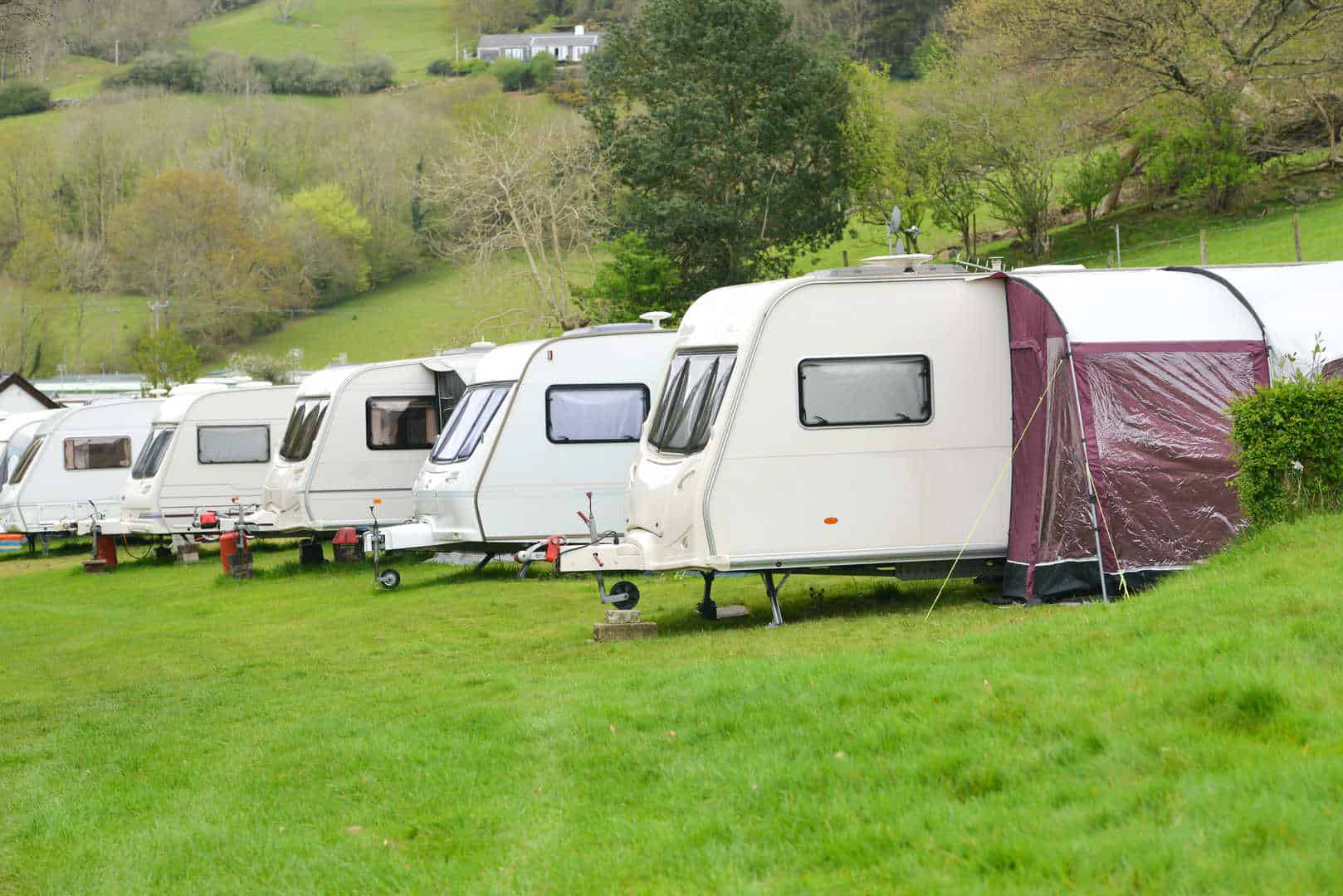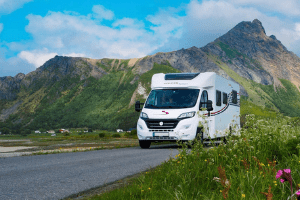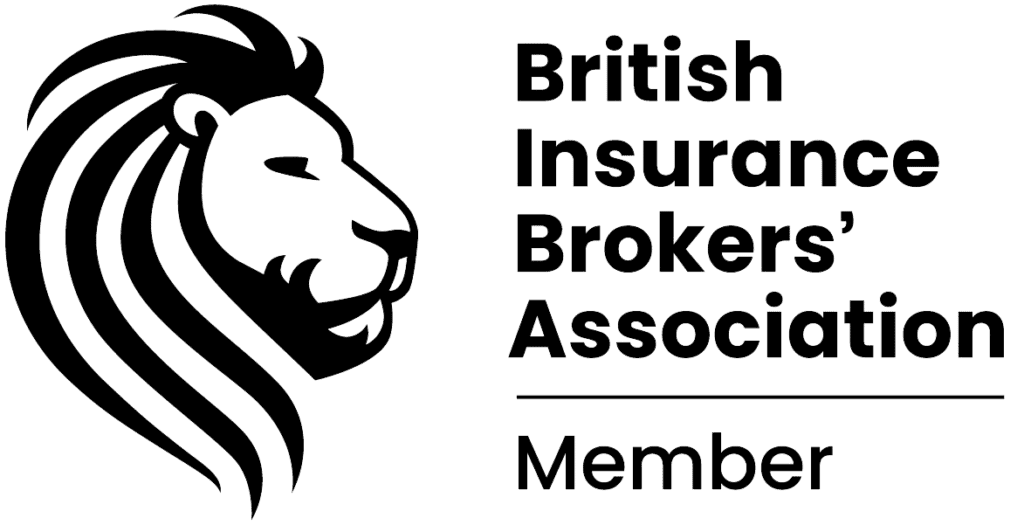Caravan insurance is essential whether your caravan is out on the road, pitched at a campsite, or being kept on the driveway.
Although caravan insurance isn’t a legal requirement, and Continuous Insurance Enforcement rules don’t apply to caravans, it’s advisable that you make sure your caravan is fully insured whether it’s on the road, on the driveway or on a campsite – there’s no telling where or when the worst can happen.
Having a standalone, comprehensive caravan insurance policy means that you’ll be covered against accidental damage to the exterior, whether it’s parked up or being towed, as well as damage to the interior. A standalone comprehensive caravan insurance policy will also provide cover for contents that you take in your caravan and can also cover you for loss or damage to awnings, generators, gas bottles etc.
A specialist caravan insurance policy will also provide cover if your caravan is stolen while it’s detached from your car, either parked outside your home or at a campsite or caravan park in the UK, subject to your insurer’s terms and conditions and specified criteria being met. Cover can also be extended to include European campsites and caravan parks.
This caravan insurance buyers guide will take you through all you need to know about caravan insurance, including the types of cover you might need, alongside some useful tips to keep the cost of your premium in check.
What is caravan insurance?
Caravan insurance is a specialist insurance policy designed to cover the unique risks of owning a caravan, including those which might not be covered by a standard car insurance policy.
A car insurance policy will cover a caravan for third-party only while the caravan is attached to the car. This means that if you’re deemed to be at fault for an accident, and the attached caravan causes injury, death or damage to somebody else’s property, then the car insurance company will only pay the amount that you are legally liable to pay to any third parties involved. Irrespective of who is at fault for an accident, your car insurer will not pay for damage to the caravan.
What is covered by caravan insurance?
A specialist caravan insurance policy should offer cover for the following incidents:
- Your caravan is stolen – Car insurance policies never cover against the theft of a caravan, regardless of whether or not it’s attached to your car. If you want theft cover, you’ll need to take out specialist caravan insurance cover that will protect against theft, whether parked outside your home, on a campsite or a caravan park in the UK. If you’re travelling to Europe, you may need to take out extra cover.
- The interior is damaged – Cover will be provided against damage to the inside of your caravan following an accident such as fire.
- The exterior is damaged – If your caravan suffers a prang while on the road, your caravan insurance policy will cover the cost of repairs.
- Third-party injuries and property damage – A caravan insurance policy will also cover the cost of any injury or damage claims made by a third party, as well as any associated repair costs if you’re found to be at fault following an accident. It’s also worth noting that cover will not be provided while the caravan is attached to the towing vehicle or if it becomes detached when being towed. Please note that this cover should be provided by the insurer of the towing vehicle.
What is the average cost of caravan insurance?
The cost of caravan insurance is dependent upon the value of the caravan, the value of contents, the value of equipment and the value of awnings. Once these variables are considered discounts may be applied.
As a general rule of thumb, the more expensive the caravan, the more it costs to insure. This is because expensive models are often more attractive to thieves and so pose a greater theft risk and have components that are more expensive to repair and replace following an accident. Insurers will always reflect this greater risk in the price of the premium they offer you.
To give you a rough idea of how much you can expect to pay, data from Nimblefins, an insurance aggregator, has found that the average cost of insurance for a touring caravan valued at £20,000 would be £300. The table below offers more insight into the average cost of caravan insurance at specific price points.
| Value of caravan | The average cost of annual premium | Expected excess |
| £5,000 | £113 | £159 |
| £9,000 | £150 | £162 |
| £21,000 | £296 | £141 |
| £30,000 | £392 | £136 |
What can you do to lower caravan insurance premiums?
There are a number of ways you can lower the cost of your caravan insurance, all of which are perfectly legal and won’t compromise the validity of your cover.
Here are some ways to lower the cost of your caravan insurance:
- Alter the excess – The excess on an insurance policy is the amount you pay towards a claim before your insurer pays the rest. Increasing the excess on your caravan insurance policy can help lower the overall cost of your premium. But be mindful of how high you set the excess and the circumstances under which you make a claim – where excess is high and caravan value is low – usually due to age and market value – you’re unlikely to get much back in the event of a claim. Also, if the excess is set high then ‘basic’ damage claims might not be worth claiming for as the excess will be higher than the value of the claim. But remember, even if you foot the bill for repairs yourself, you still need to let your insurer know you’ve been involved in an accident or suffered a loss.
- Only take out the cover you need – Insurance policies often come with all sorts of additional extras, some of which you may not even need. That’s why it helps to talk to an insurance expert to ensure that the cover meets your specific insurance requirements and will make sure you don’t pay for any unnecessary extras. Give our caravan insurance experts a call on 0208 9840 666 to find out more.
- Don’t over-value your caravan – As mentioned above, caravans that are worth more usually command higher insurance premiums. If you overvalue your caravan or its contents then you might end up paying more than you have to. Insurance companies only use this information to calculate your quote. When it comes to paying out on claims then market valuations are used. On the flip side, it’s also important to make sure you don’t under-insure your caravan. If you do, the settlement from your insurance claim won’t be enough to cover the cost of repairs or replacement and could leave you out of pocket.
- Improve your caravan security – Most insurers will cut the cost of your premium if you fit additional anti-theft devices, such as wheel locks, hitch locks, alarms and trackers. These devices make it more difficult for thieves to make off with your caravan or make it easier to recover and this should be reflected in the cost of your cover. Make sure any devices you fit are insurer-approved. Keeping your caravan in storage or lock-up when it’s not in use can also reduce the price of your premium. It can also help to register your caravan with the Central Registration and Identification Scheme (CRiS). Registration with CRiS means that, if it’s stolen, there’s a better chance that the police will be able to get it back to you.
- Take a driving course – The amount of experience you have of towing a caravan can also affect the cost of cover and taking advanced driving courses will demonstrate that you are conscientious as well as knowledgeable about towing. Consider the following courses and qualifications, they might even help lower the cost of your car insurance:
-
- Drivecraft
- The Caravan Club
- The Camping and Caravanning Club
- IAM (Institute of Advanced Motorists)
- HGV driving courses (various commercial providers)
- Check you’re not covered elsewhere – You might find that your home insurance policy covers you for theft or damage to any of the things you take with you in your caravan. If your home contents insurance policy has ‘all risks’ or ‘personal possessions’ cover included, this means certain valuable items are covered outside the home, including in a caravan. The cover is for things like computers, clothes and jewellery (things you regularly take out of the house) and is usually available up to a certain limit, usually around £1,500. If you carry a lot of valuable gadgets around, including phones, tablets and smartwatches, it might be worth taking out separate gadget insurance.
What determines the cost of caravan insurance?
There are a number of factors that affect the cost of caravan insurance and insurers will usually impose higher premiums to reflect the increased risk of insuring your caravan or the cost of repairs or replacement.
The main things that could affect the cost of cover are:
- Your driving history – If you have any convictions, driving bans, or even any points on your licence, insurers might consider you a greater risk on the road and push up the price of cover to reflect this.
- Your experience on the road – As with car insurance, younger drivers are considered a greater risk, but even if you’re an older driver you may find the cost of cover increases if you have little or no experience of towing a caravan.
- Where the caravan is kept overnight – Insurers will usually lower the cost of cover if you keep your caravan in a lock-up or secure driveway when not in use. It might also be worth considering a CaSSOA storage facility. If it’s kept on a public road, it is at greater risk of being stolen or damaged and insurers will increase the cost of cover to reflect this.
- Additional security devices – If you fit extra, insurer-approved security devices to your caravan, including alarms, tracking devices and wheel locks, your insurer should lower the cost of cover.
- The cost of the caravan – In general, the higher the value of the caravan, the more it costs to insure. This is because it will cost more to repair or replace in the event of an accident or theft. You may also find your insurance premium is higher if your caravan is a relatively rare make or model. This is because parts and components are usually harder to come by, meaning repairs are more costly and so insurers increase premium prices to reflect this.
- The level of your excess – The cost of cover often changes according to the level you set your excess at, with a higher excess usually commanding a lower premium price.
- Any named drivers on your policy – Although having an older named driver on your car insurance policy can often bring down the cost of cover, if you have multiple named drivers on your policy, this could push the cost of cover up. Even if you just have one named driver on your caravan insurance policy, the cost of cover will depend upon their age, driving history and caravan towing experience.
- Permanent siting – Although this guide is largely for touring caravans and assumes you’ll be taking your caravan on the road, if you keep your caravan permanently on one site, this can reduce the risk and help to reduce the cost of cover. Check with your insurer to see if they offer this option
- Caravan Club membership – Having Caravan Club membership might get you discounted cover with certain insurers.
How to find out the value of your touring caravan
When taking out caravan cover, your insurer will ask you how much your caravan is worth. This is so they can take into account the cost of replacement and return an accurate quote.
If you’ve just bought a brand new caravan, you can simply use the invoice price you paid for it, but valuing a second-hand caravan can be slightly trickier. As a starting point, use the price that you paid for it, then consider how long ago you bought it alongside the year it was manufactured, its current condition and the number of people it sleeps.
You should also take into account any features that were part of its original specification alongside any additional features.
You then need to look at other models on the market, of similar make, age and specification, to see what they’re selling for and then set your valuation accordingly. Alternatively, you could take it to a registered dealership who can guide you on how much your caravan is worth.
What kind of cover do I need?
To make sure you get the right level of cover to suit your needs, you should consider where and when you use your caravan. If you take it abroad, for instance, consider how many days a year you usually travel overseas. Comfort Insurance policies provide 182 days foreign use cover as standard.
Where you store your caravan is also a consideration, so you’ll want to make sure your caravan security is up to scratch, whether you’re on a campsite or your caravan is parked up at home.
Although the price is important, it’s crucial to make sure your insurance policy covers you against all possible risks, so you should tailor it to meet all your requirements. A good caravan policy provided by a reputable broker or specialist caravan broker should make sure you have the necessary cover in place.
At Comfort Insurance, provided your caravan has been insured for the correct value, we will give you a brand new replacement if it’s damaged beyond economic repair and is less than five years old. If the caravan is five or more years old, we’ll only pay its market value. Other useful covers provided under specialist caravan insurance policies include legal expenses and key cover, both of which come as standard with a Comfort Insurance policy.’
Can friends and family drive my caravan?
A caravan holiday can be heavy going for drivers, so it makes sense to have another driver shoulder the burden. If you want a friend or family member to take responsibility for towing your caravan, you may need to add them to your caravan insurance policy or take out temporary caravan insurance that covers them for the duration of the trip.
Terms will vary from insurer to insurer, but Comfort Insurance policies provide cover for insured, spouse and family members residing at the policyholder’s address.
If my caravan is too heavy will I be covered?
If your caravan is too heavy, you won’t be insured. This is because there are a number of rules which dictate exactly the size of the load you’re allowed to tow.
The size of caravan you can tow depends upon two things – the weight your car can physically pull and the date you passed your driving test.
Your car will have an official maximum weight that it can tow. Here are some of the maximum loads that a selection of UK models can handle:
| Make and model | Maximum towing weight |
| Ford Fiesta | Up to 900kg |
| Nissan Qashqai | Up to 1,000kg |
| Volvo XC90 | Up to 2,700kg |
| Kia Sportage | Up to 2,200kg |
| BMW X5 | Up to 3,500kg |
If you passed your test after January 1, 1997, your driving licence will only permit you to tow a load that weighs no more than 3,500kg. If you passed before January 1, 1997, you’ll be able to tow a load up to 7,500kg.
To find out vehicle’s weight, check your car handbook and your caravan documents.
How to make a claim on your caravan insurance
Hopefully, you’ll never need to claim on your caravan insurance, but here’s what to do if the worst ever happens:
- Notify the police – If your caravan is maliciously damaged, stolen, or involved in a road accident, you should notify the police. If it’s stolen, or if it’s broken into and has any items stolen from it, the police will give you a crime reference number which you’ll need to make a successful claim on a home or specialist caravan insurance policy. Obviously, if it’s just a small scrape, there’s probably no need to notify the police (unless, perhaps, it was malicious damage) and it might not even be worth claiming on your insurance, depending upon the size of your excess.
- Notify your insurer – If you need to make a claim of any kind, it’s important to notify your insurer as soon as possible. If it’s a complex claim, it may take a while to be processed, so the sooner you get the ball rolling, the sooner your claim will be settled.
It’s unlikely that your claim will be called into question, but you should always keep any receipts from when you bought the caravan, as well as receipts for any work that has been done and any extras you’ve had fitted, including things like alloy wheels and extra security devices. All will come in handy as proof of purchase if requested by your insurer.
Caravan insurance FAQs
Here we answer some of the most common caravan insurance questions.
Do I need caravan insurance?
You’re not required by law to have caravan insurance in place, but it’s recommended you take out specialist caravan insurance if you ever plan to take your caravan on the road. Even if your caravan is not in use it might be worth taking out insurance to cover against accidental or malicious damage, fire or theft.
What’s the difference between a touring caravan and a static caravan?
As the name suggests, a touring caravan is one that has been designed to be towed, while a static caravan is one that stays in one place. Different insurance policies are required for touring and static caravans.
What licence do I need to drive a caravan?
You should be able to tow a caravan using a standard driving licence, but it all depends upon the weight of the caravan and when you passed your driving test.
- If you passed your test after January 1, 1997, your driving licence will only permit you to tow a load that weighs no more than 3,500kg.
- If you passed before January 1, 1997, you’ll be able to tow loads between 3,500kg and 7,500kg. Read our article on renewing your driving licence if you’re over 70.
When should you update your touring caravan policy
You should update your touring caravan at each policy anniversary to ensure your policy never expires and you’re never left without cover. And check at renewal that all details held by your insurer that relate to you and your caravan are correct. If any are incorrect or inaccurate, let your insurer know of any changes that need to be made.
You should also update your caravan insurance in the following instances:
- You’ve moved home or changed where your caravan is stored
- You’ve fitted any extra security devices
- You’ve changed the specification of your caravan e.g. fitted alloy wheels
- You’ve replaced your old caravan with a different model
- You’ve not got European cover but planning on taking your caravan abroad
What are touring caravan insurance exclusions?
Although your caravan insurance policy will cover you against most risks, there are certain eventualities that will be excluded:
You’ll find the full list of policy exclusions in your policy documents. However here are a few exclusions that often escape our customers’ attention:
- Leisure use only – Most policies will only cover caravans for leisure use by the policyholder. If you live in your caravan or hire it out, your caravan won’t be covered.
- Mechanical breakdown – While a caravan policy will cover you for emergency removal in the event of an accident if it cannot be towed away, it may not cover you for any sort of mechanical breakdown. To protect against this risk, ensure your caravan is properly maintained and take out separate breakdown cover – your car breakdown policy may cover trailers and caravans, but you need to check if there’s a length limit that applies. Your tyres won’t be covered either and you may find your insurance claim is rejected if your caravan is involved in an accident due to you not properly maintaining your caravan and its tyres.
Can I add cover to my caravan insurance policy?
If you need to take out extra cover for your caravan or any items kept in it, you might want to consider the following:
- Contents cover – While many of your caravan’s contents will be covered as part of your caravan insurance, there will be certain items that are excluded. So check to see whether phones and laptops are covered. If not, see if they’re covered by your home insurance, or consider taking out standalone gadget insurance. The same applies to things like TV and kitchenware that are permanently stored in the caravan.
- Awning cover – If your caravan has an awning, you may need extra insurance to cover it against loss or damage. Be aware that you’ll need to specify the value of your awning when adding this cover.
Touring caravan insurance jargon buster
The final hurdle to overcome when buying caravan insurance is the jargon used by insurers – our caravan insurance jargon-buster will help clear things up.
- Indemnity – Putting you back in the same financial position as you were before a loss occurred.
- Public liability – This covers you against legal and compensation costs if you are responsible for causing injury or property damage to another person.
- Loss of use cover – If your caravan is left uninhabitable due to an accident covered under the policy, this provides a contribution towards the cost of alternative accommodation.
- Excess – The payment you make towards a claim on your policy before your insurer pays the rest of the claim.
- New for old – In the event of a total loss, your caravan will be covered for replacement with a brand new equivalent model.
- Market value – The cost of replacing your caravan at its present value – taking into consideration the year of manufacture, type, wear and tear. If you’re wondering ‘what is the market value of my caravan?’ It’s worth speaking to an independent dealer.
- Policy schedule – Your insurance document outlining the period during which your policy is valid, as well as the cover you have, your premium and details of the caravan you are insuring.
How to insure your caravan
It’s now time to insure your caravan to make sure you’re fully insured and covered whether it’s being kept in storage or is out on the road.
To find the right policy to suit your needs, give our insurance experts a call on 0208 9840 666 – our unrivalled choice of policies is what makes 95% of our customers rate our service as ‘Excellent’ on Trustpilot with a customer satisfaction score of 4.9 out of 5*.
*October 2019.













